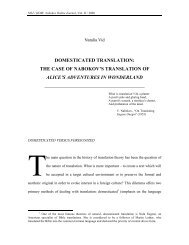Nabokov's Invitation to Plato's Beheading
Nabokov's Invitation to Plato's Beheading
Nabokov's Invitation to Plato's Beheading
- TAGS
- beheading
- etc.dal.ca
You also want an ePaper? Increase the reach of your titles
YUMPU automatically turns print PDFs into web optimized ePapers that Google loves.
NOJ / НОЖ: Nabokov Online Journal, Vol. I / 2007<br />
execution and completes it moments before what would be her execution which she<br />
narrowly avoids by breaking the spell. At the end of the s<strong>to</strong>ry, we see twelve swans turn<br />
in<strong>to</strong> young man and the princess, who grew ugly in her labors, regains her beauty.<br />
Nabokov’s reference <strong>to</strong> this fairy-tale, which culminates in a triumphant transformation<br />
of an innocent criminal who is reunited with her brothers, encourages us <strong>to</strong> think that<br />
Cincinnatus also survived his execution.<br />
Even more suggestive of Cincinnatus’ immortality is the optimistic epigraph by a<br />
certain Delalande which opens the novel: “Comme un fou se croit Dieu, nous nous<br />
croyons mortels” (“As madman believes himself <strong>to</strong> be a God, we believe ourselves <strong>to</strong> be<br />
immortal”). In The Gift, where we encounter Delalande for the first time, he echoes<br />
Socrates when he declares that death is “the liberation of the soul from the eye-sockets of<br />
flesh and our transformation in<strong>to</strong> one complete and free eye, which can simultaneously<br />
see in all directions, or <strong>to</strong> put it differently: a supersensory insight in<strong>to</strong> the world<br />
accompanied by our inner participation” (310). Delalande’s statement clearly echoes<br />
Socrates’ argument that “when we are dead, [we] attain that which we desire and of<br />
which we claim <strong>to</strong> be lovers, namely, wisdom [. . .]; for it is impossible <strong>to</strong> attain any pure<br />
knowledge with the body [. . .]: either we can never attain knowledge or we can do so<br />
after death. [. . .] In this way we shall escape the contamination of the body’s folly; we<br />
shall be likely <strong>to</strong> be in the company of people of the same kind” (66e-67a).<br />
But <strong>to</strong> trust Delalande, whom Nabokov invented, is as misleading as accepting<br />
fictitious John Ray Jr. as an authority on Lolita. No matter how attractive and captivating<br />
Delalande’s epigraph may seem <strong>to</strong> us, Cincinnatus, for his part, cannot shake off the<br />
suspicion that we might be mad <strong>to</strong> think that we are immortal. In spite of all these
















